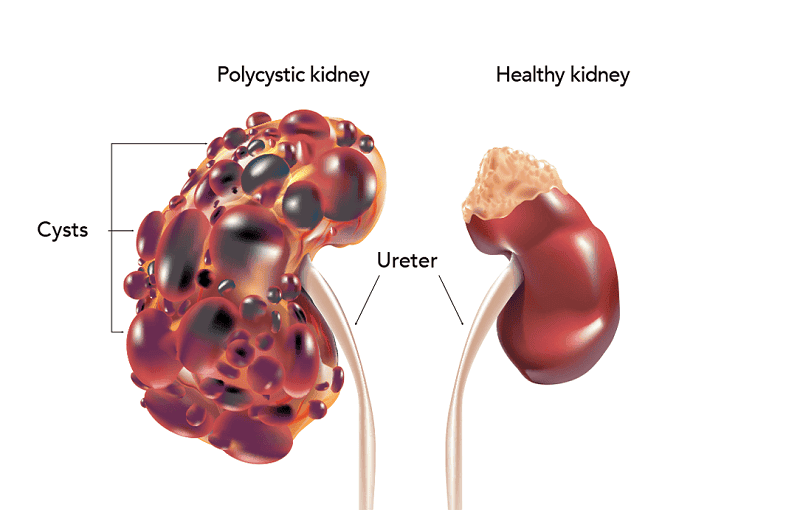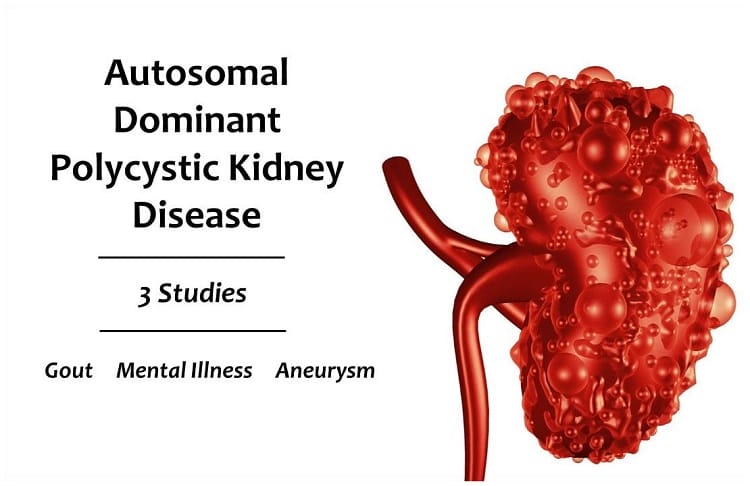What are cysts?
Cysts are sac-like pockets filled with fluid, air, or other substances. When people develop many cysts inside or on the kidneys, the condition is called PKD (Polycystic Kidney Disease). The growth of these cysts increases the size of the kidneys much more significantly than their actual size. The number of cysts in the kidneys can vary from a few to thousands in the kidneys. A kidney with PKD can weigh up to 30 pounds and thus makes it difficult to deal with.
According to Ayurveda, any problem that arises in the body is due to an undisciplined lifestyle, inadequate diet or lack of physical activity. Polycystic kidney disease treatment in Ayurveda can help in the regulation of PKD. Polycystic kidney disease ayurvedic treatment suggests lifestyle changes that help you reduce kidney damage.

Polycystic kidney disease (PKD) is one of the genetically transferred diseases. It is a condition where cysts grow in or on the surface of the kidneys. As per the Ayurvedic view, three doshas (Vata, Pitta and Kapha) drive the functions of the body organs. However, when these doshas are imbalanced, a kidney cyst or Gurda Granthi may form. PKD varies in severity, but the complications caused can be prevented well.
Polycystic kidney disease can cause chronic kidney disease or CKD in the end stage. The development of cysts in kidneys increases the size of the kidneys and damages the tissues that the kidneys are made of. This later becomes the reason for kidney failure or end-stage renal disease (ESRD).
Polycystic kidney diseases are of two types:
Autosomal dominant PKD
Autosomal recessive PKD.

Autosomal dominant PKD (ADPKD)
Cyst development is restricted to the area around the kidneys in this syndrome. This condition is also called “Adult PKD.” Because persons with this disease may not have symptoms until they are between 30 and 50 years, the condition is known as adult PKD.
Autosomal recessive PKD (ARPKD)
The term “Infantile PKD” is another name for autosomal recessive PKD. Because this illness has been noted in infants as early as the first few months of life or even before birth, it is known as infantile PKD. ayurvedic treatment for kidney cyst develop in the liver and kidneys simultaneously.

What are the causes of Polycystic Kidney Disease?
PKD treatment in ayurveda; it can be inherited from any of the parents. It is observed in people of any gender, age, race, ethnicity, and nationality. It might be recessive in one generation but can be dominant in the other. Therefore, if your blood relative is carrying PKD, you might also have the probability of developing PKD, or you might be carrying the genes causing it.
People who do not show the signs and symptoms of PKD but carry the genes causing PKD are called carriers. This condition is observed in autosomal recessive PKD.
Can you live a normal life with PKD?
There is no sure-shot cure for autosomal dominant PKD. Thus the treatment involves the management of the symptoms and preventing further development of complications. It also works towards a decrease in the progression of the disease. One can live an everyday life easier if the cyst is not creating any trouble in regular daily life. The problem in the advanced stage may obstruct the functioning of the kidneys and cause frequent infections. The state thus becomes troublesome and needs immediate management.
What is the role of Ayurveda in PKD? How can it make you win in 2023?
Ayurveda works on adopting a healthy lifestyle that will make your life stress-free. It helps you control the progression of PKD and works on the rejuvenation of the kidneys. There are various herbs and medications already described in ancient ayurvedic texts that are proven to extend the life of renal patients.
Ayurveda also works to improve the immunity of the body to fight against diseases. There are various herbs with different modes of action. These herbs are used in certain combinations for treating kidney patients. The herbs generally described in ayurveda for kidney diseases are Gokshura, Guggul, Haridra, Vijayasar, Varun etc. There are many more herbs to add to the list. These herbs may be used alone or mixed in certain proportions depending on the need or type of the disease.

Along with the medicines, there are general guidelines to be followed to keep you healthy and fit.
1. Eat fresh vegetables and fruits.
2. Drink an adequate amount of water.
3. A low-fat and low-sodium diet to keep the blood pressure in control.
4. Maintain a regular activity schedule with daily exercise of at least 30 minutes under medical supervision
5. Maintain a healthy weight.
6. Detoxify the body with herbs.
7. Avoid smoking and alcohol consumption.
8. Avoid or reduce non-vegetarian and dairy products.
9. Keep your blood sugar levels in control
It is always advisable to use any herb mentioned above or ayurvedic medicine online store under proper medical supervision.

